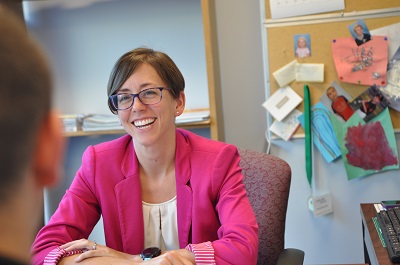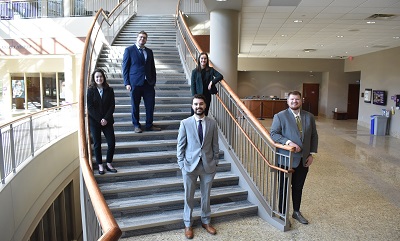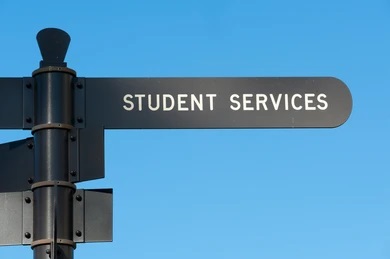By: Sarah Dylag Beznoska, Assistant Dean for Student and Career Services,
Cleveland-Marshall College of Law, Cleveland State University
It comes as no surprise to those of us who work with law students on first destinations and career paths that when the National Association for Law Placement (NALP) studied national employment statistics for the graduating class of 2020, it found that whether or not you are a first-generation law student impacts your career outcomes in the law.
NALP reported: “Overall, Class of 2020 continuing-generation JD students (graduates who have at least one parent or guardian with a JD degree) and continuing-generation college students (graduates who have at least one parent or guardian with a bachelor’s degree or higher, but whose parents/guardians all lack a JD degree) had a higher employment rate and were more likely to be employed in a bar passage required/anticipated job than their first-generation college student peers.”
The Law Student Survey of Student Engagement (LSSSE) also consistently highlights important disparities related to first-generation law students. From LSSSE, we know that first-generation law students bear more law school debt and face significant stressors related to debt. We know that “the amount of time that first-generation law students [spend] with peers and faculty outside of class [is] significantly less than non-first-generation law students.” LSSSE data has shown that first-generation students also participate in co-curricular opportunities at a lower rate that non-first-generation students, spend more time studying, and spend more time working to support themselves.
This data should be important to everyone in the legal industry, especially as we talk about diversifying our workplaces and our leadership. It is particularly important to me as someone who works in career services at an urban law school that serves a significant population of first-generation college and law students. To provide the best student and career services to our students, we are continually assessing our work through the viewpoint of first-generation students and making adjustments to provide better support.
This assessment can be done for professional identity formation (PIF) too. Understanding and accounting for the unique experiences noted above is critical to developing any comprehensive PIF plan. On the positive side of things, schools can leverage PIF to build belonging for first-generation students. At the same time, being mindful about the time constraints sometimes faced by first-generation students might inform the methods a school chooses for offering PIF opportunities.
First-Generation Students and Law School Culture: Professional Identity to Build Belonging
Belonging matters to law student success, and most especially to first-generation law students. The unique culture of law school and the legal industry can be a challenging adjustment even when someone has lawyers in their family. Without knowing any lawyers or having people already in their network to ask for help, first-generation law students can feel like outsiders from day one. (For some insights on the first-gen experience see: https://abaforlawstudents.com/2021/08/25/first-generation-law-student-challenges/ and https://abaforlawstudents.com/2020/01/01/how-to-thrive-as-a-first-generation-law-student/).
For this reason, I have sometimes been skeptical of the premise of professional identity formation that focuses on students moving from an “outsider” in the profession to an “insider” in the profession. As someone who was a first-generation law student myself (although I was not the first in my family to attend college), I know very personally that not having lawyers in my family or lawyers in my network impacted my law school experience in a negative way. From day one of law school, I internalized deeply that I did not belong and, although my law school trained me well on the doctrinal skills, I never once came to a place there where I felt like an “insider.”
It is because of this personal experience, however, and because of the commitment I have to making sure that first-generation students at the law school where I work never feel this same way, that – as much as I can be skeptical about the terminology of PIF – I think PIF can be leveraged to build more belonging. There are a variety of ways a school might use PIF to increase belonging. For example:
- Self-Assessment and Industry-Focused Panels: having students complete self-assessment exercises allows them to identify strengths and values that they bring with them to the profession. Taking it a step further, once schools provide an opportunity for students to identify their strengths and values, schools can offer diverse panels of attorneys to demonstrate the varying skillsets that can make someone successful. Providing students with opportunities to know their own strengths and then to see those things in successful practitioners can help them to feel like there is a place in the law for them and who they are matters.
- Mentoring: providing thoughtful mentoring opportunities allows students to feel less alone in their journey through law school. Schools can engage alumni, peers, faculty, and staff in formal and informal mentoring programs with students, giving them a broad set of people to whom they can turn for support. Consider, also, having faculty, staff, or alumni identify themselves to students as first-generation students, so that your first-generation cohort has examples of first-generation success stories.
- Student Organizations: schools can support student leaders to create a robust community of student engagement and a space where students can connect with each other and feel less alone. Connecting student organizations to a school’s alumni network can be helpful and assisting student organizations with career-related programs can give students more opportunities to understand the variety of paths in the law.
These three things have worked for us as a starting point to increase belonging at Cleveland-Marshall College of Law. We start at day one when we dedicate a portion of our Orientation to professional identity. This Orientation program covers the essential eligibility requirements for the practice of law in Ohio and the 26 Lawyering Effectiveness Factors. More importantly, it includes diverse panel speakers who reflect on what these things mean in their practice, along with when and where they developed these skills.
We also require incoming law students to complete the Law Fit assessment, and we use those assessments with them in their meetings with career advisors. In addition, together with my team in Student and Career Services, we have built a one-on-one alumni mentor program and a one-on-one peer mentor program for every first-year student who enrolls with us. Later this Fall, we will offer a Storytelling event to our student body, in partnership with our First-Generation Law Student Association, focusing on things like times when we and they have felt imposter syndrome and why one’s personal story matters.
First-Generation Students and Time: Creating Meaningful Space for Students to Reflect
One of the foundational concepts behind PIF is reflective thinking and opportunities for reflective exercises to help students understand their values, the values of the profession, and the competencies required to be a successful lawyer. Reflection, in turn, requires time and space that are carved out to allow specifically for it. Time is a valuable resource for all students, but especially for first-generation law students. Therefore, PIF plans must be mindful of these time constraints.
There are a lot of reasons why first-generation students might not have time for PIF. For example, if they are working significant hours outside of the law school in legal or especially in non-legal jobs to support themselves, if they face family or personal expectations or obligations (especially from family members or personal connections who are unfamiliar with the legal industry), if they are trying to plan the logistics of taking two months off (unpaid and without benefits) after graduation to study for the bar exam, or if they are de-railed by a financial, health, or other crisis without social capital or resources to support them. In the optional space of Student and Career Services, when we support students with challenges like these, there is sometimes precious little time or energy available to ask students to reflect on how a chosen work or academic experience contributes to their professional identity.
Worse, when I see my first-generation students struggling with time, I worry that PIF will feel to them like optional engagement that is only possible for those law students who are supported by deep family resources or who are not struggling with other life priorities. I also worry whether they will trust me if I ask them to add to their already overflowing plates the additional work required by PIF. Notably, I believe these students are frequently already very self-directed learners, but they are people with clear and important demands on their time that often do not leave room for any optional piece of the law school curriculum.
For this reason – to bring all students along in PIF – schools must be creative about how and when to include PIF in the law school experience, and be respectful of the time constraints students might face, depending on their circumstances.
- Bring PIF to Students: one option, of course, is to build into the existing curriculum opportunities for reflection and discussions about professional identity. But, if that won’t work for your school/classroom, schools might consider inviting the career services team to stop by before or after classes to provide handouts or resources that are aligned with related career paths. Schools can emphasize the importance of related programming that is happening outside of the classroom and encourage students to make strategic decisions about which to attend. Schools can include in other required spaces – Orientation, graduation-required courses, student leader trainings – information about building lawyering skills. Schools can encourage students to work with academic advisors, staff, or alumni to create a plan that works for them, and schools can help those advisors, staff, and alumni to have the PIF information they need to be impactful.
- Create a PIF-focused Course: changing the curriculum to include a new course is another option, and one that may or may not be a fit for a school. For better or worse, however, we know that in a world impacted by COVID, general student engagement in optional parts of the law school experience is significantly decreased. Add to that the time constraints we know our first-generation students face and we simply cannot wait for students to come to us. As I’ve learned from my colleagues in the undergraduate space, we are responsible for finding ways to go to them. One way to go to them is to create a credit-bearing course that will reward students for doing PIF work while creating a meaningful space for first-generation and other time-strapped students to include the work among their other priorities.
At Cleveland-Marshall College of Law, Students and Career Services has seen some movement with bringing PIF to students. For example, my department no longer expects that attendance will be robust at optional career related programs. Instead, we collaborate with student organizations on panel presentations and visit their student organization meetings to connect. We bring handouts and resources to student-run events, instead of requiring them to come to us for the information. We try to model the behavior we are seeking from students by showing up to the programs and panels that they have organized rather than simply demanding they show up at ours. We also leverage our alumni and peer mentor programs to provide resources to students. It is clear to us that peer-to-peer advising among students is at an all-time high, and rather than discourage or limit this connection, we provide information and resources to support it.
Perhaps most importantly, we try to ask students for input on what kinds of activities will help them most when it comes to lawyering skills. Without exception, they prefer activities that require engagement from them, opportunities to become involved in the community through pro bono work, and learning experiences where they connect with others. As a result, we are adjusting our traditional Student and Career Services programming to offer more of these kinds of experiences, and fewer lectures/presentations, while also incorporating reflective coaching questions into our everyday conversations with students.
Conclusion
Supporting first-generation law students to succeed is a critical component of increasing diversity in the legal industry. When PIF is offered thoughtfully and in a way that is mindful of time as a resource, it can be a place where schools can provide that support, not just through efforts focused on belonging, but also efforts focused on financial wellness, building support networks, introductions to professional norms, and academic planning.
If you have any questions or comments about this post, then please feel free to contact me at s.beznoska@csuohio.edu.

Sarah Dylag Beznoska is the Assistant Dean for Student and Career Services at Cleveland-Marshall College of Law at Cleveland State University.



